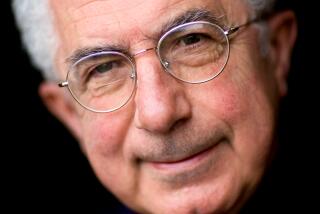The Judgment of History Can Be Fickle
- Share via
With each passing year, “news” is downloaded into “history.” And while nothing is as fleeting as a headline, our collective understanding of the past is also under constant revision. As Samuel Butler, the 19th century English novelist, put it, “God through his omnipotence cannot change the past. Therefore, he created historians.”
The long struggle against communism ended less than a decade ago and yet historians are hard at work, sending some Cold War protagonists on the “up” escalator toward heroic immortality and others on the “down” escalator, to ignominy or oblivion.
As he recuperates from his appendectomy in a Rome hospital, Pope John Paul II is heading higher. Some 7,000 miles away, in a Los Angeles graveyard, Armand Hammer, dead six years, is sinking deeper.
From Warsaw to Moscow, from Washington to Rome, historians are harvesting long-stashed files. Allen Weinstein, president of the Center for Democracy, observes, “Whereas once researchers had to make do with a single document” such as Soviet leader Nikita Khrushchev’s 1956 secret speech in the Kremlin, now they have access to “a veritable flood of material.”
Two new books, both reliant on recently uncorked information, illustrate this process. “His Holiness: John Paul II and the Hidden History of Our Time,” by Carl Bernstein and Marco Politi will force a reassessment of the pontiff’s role as a geopolitical strategist as well as religious leader. The authors call him “the last of the giants on the world stage.”
Meanwhile, in “Dossier: The Secret History of Armand Hammer,” Edward Jay Epstein clobbers the late chief of Occidental Petroleum. Epstein paints a picture of Hammer as a willing--and profiteering--collaborator with the Soviet Union, beginning in 1922, when V. I. Lenin, the founder of the Evil Empire, told his henchmen that Hammer was the “path” to American capital, “and this path should be made use of in every way.”
When the Soviet Union appeared to be a permanent player on the world scene, American “ethnics”--the sort of people who went to special masses for the liberation of Eastern Europe--seemed hopelessly out of touch with the everlasting reality of the Berlin Wall. And men such as Hammer were regarded as necessary intermediaries between East and West. Indeed, in his declining days of grandiloquence, Hammer lobbied for a Nobel Peace Prize. Yet now he is revealed as a stooge rather than a statesman, a willing trafficker in blood money. As John Berresford, a Washington writer at work on a history of the Alger Hiss case, puts it, “Hiss and Julius Rosenberg betrayed their country because they sincerely thought they were building a better world. Hammer was simply in it for profit.”
Then there is the late CIA director William Casey, usually depicted as a mumble-mouthed troglodyte turned Iran-Contra cowboy; he was pummeled by Bernstein’s former Watergate partner, Bob Woodward, in “Veil: The Secret Wars of CIA 1981-1987.” Bernstein and Politi, however, have Casey as a savvy diplomat who saw early on that Poland could be broken loose from Soviet domination and that the pope was the key.
On the other hand, the Gore family may feel that Hammer’s ghost is tugging them down. Epstein writes that in the 1940s and ‘50s, Hammer’s “principal contact” among congressional Democrats was Albert Gore Sr., father of the current vice president. Epstein even adds a morsel that merits further inquiry: “In 1950, Hammer had made Congressman Gore a partner in his cattle-raising business, and Gore made a substantial profit.”
Three decades later, Albert Gore Jr., by then a member of Congress himself, took Hammer as his guest to Ronald Reagan’s 1981 inaugural. In turn, Hammer contributed to Gore’s campaigns and hosted at least one fund-raiser for his 1988 presidential bid. And the Washington Post reported in 1992 that for nearly two decades, the vice president had been receiving $20,000 per year from an Occidental subsidiary. As the Post delicately put it, “The check is the product of an unusually valuable lease for zinc rights his father, Albert Gore Sr., negotiated” with Hammer.
As with journalists, historians can become overly dependent on accessible sources. Vatican officials freely dispense pro-pope tidbits, while Hammer’s memory is being trashed by disinherited relatives and embittered mistresses. But that should just remind us that a place in history’s pantheon can depend on living a good life as well as doing great deeds.
More to Read
Sign up for our Book Club newsletter
Get the latest news, events and more from the Los Angeles Times Book Club, and help us get L.A. reading and talking.
You may occasionally receive promotional content from the Los Angeles Times.










